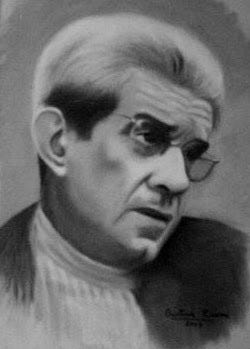How not to read Lacan
Scott Alexander tries to make sense of Lacanian psychoanalysis. Been there, done that. And I won't do it again, because I think it is reasonable to assume that the writings Lacan left for posterity actually don't make sense at all. I can explain why:
Very few people read Lacan because his texts make sense, are enjoyable to read or because they really understand the world better through reading them. Instead, people read Lacan (or try to read Lacan, actually reading it is nigh on impossible) because his texts should be meaningful. After all, Jacques Lacan was very famous in his field. He must have been famous for something, right?
And he was. Just not for writing. Mid-20th century Paris had a very living oral culture. A clique of intellectuals gave lectures and held meetings where they talked, talked and talked. It produced celebrities who never wrote any famous texts, but who are ceaselessly referred to by famous authors of the era. Alexandre Kojève is such a figure. He never wrote anything that was published during his lifetime, but his lectures influenced a generation of intellectuals who wrote things.
In Kojève's case, being very influential was possible without writing anything at all. In Lacan's case, being very influential was possible without writing anything coherent and comprehensive. In contrast to Kojève, Lacan's writings were published during his life-time, sold well and were subsequently translated into several languages. But they were published in 1966, during the height of intellectual mass psychosis of the 1960s, and Lacan was strongly associated with the extreme left. That makes me suspect that people liked Lacan's writings not for what they said, but for what they symbolized.
A teacher above all
Lacan didn't even pretend to be a writer. In the early 1960s a student, Jacques-Alain Miller, took on the task to edit and explain Lacan's thoughts. Miller worked intensely on the project, befriended Lacan and even married his daughter in the process. Maybe it is unfair to claim that Miller had to do that because Lacan couldn't write himself, but Lacan obviously put little focus on writing. Instead, he self-identified as a teacher of Freudian psychoanalysis. He seems to have excelled in that role, being a charismatic teacher and discussion partner who could clarify and develop the concepts that were considered important at the time. Nowadays there are more exciting thoughts about the human mind than Freudianism, but I imagine that for someone into the game in mid-20th century Paris, listening to Jacques Lacan would be really thought-provoking.
I don't say Lacan didn't have unique thoughts. Although psychoanalysis has its clear limitations, I don't even assume everything he came up with was useless. I just want to caution against the assumption that a collection of seemingly extremely badly written texts is something brilliant just because its author was very famous. History suggests Lacan earned his fame through the spoken word, not through his writings. Then it is reasonable to assume there is a simple explanation behind the undecodable nature of the texts he nonetheless produced: Jacques Lacan never had to learn how to write, because he was successful and famous anyway.



